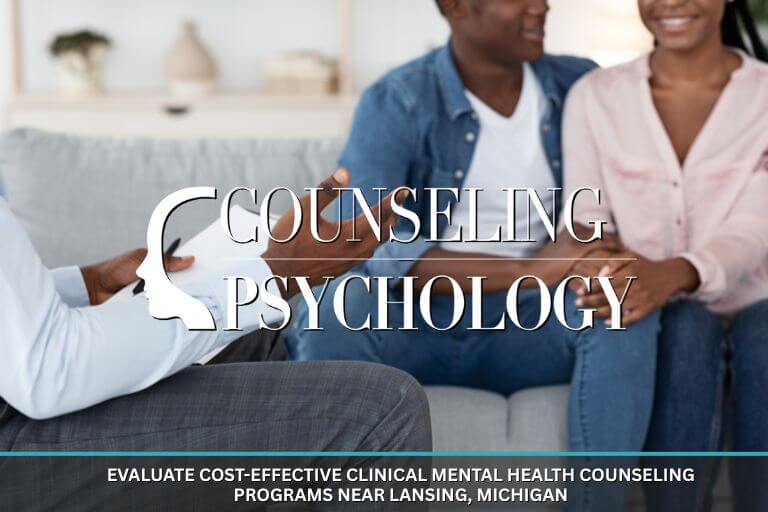Evaluate Cost Effective Clinical Mental Health Counseling Programs Near Lansing, Michigan

Mental health needs across Michigan have grown steadily, with Lansing positioned as a central hub for behavioral health services. According to National Institute of Mental Health data, nearly 1 in 5 adults in Michigan experiences symptoms of a mental health condition each year, with anxiety and depression among the most common. These trends reflect a growing national crisis, but Lansing's central location and established healthcare systems allow it to serve as a focal point for addressing the problem locally. Reports from Michigan Department of Health and Human Services emphasize that demand for behavioral health support continues to climb, making mental health a pressing priority for the capital area.
For those seeking to enter the counseling profession or advance current credentials, cost effective programs near Lansing provide practical pathways to licensure while balancing affordability with academic rigor. Clinical mental health counseling programs also serve the broader community by preparing graduates who are equipped to address pressing issues such as access to care, prevention initiatives, and long term recovery support in Mid-Michigan. Affordable options help ensure that new counselors can enter the workforce without overwhelming debt while still gaining the skills necessary to make a lasting difference.
2026 Explore Cost Effective Clinical Mental Health Counseling Programs Near Lansing, MI
Alma College
Alma, MI - Private 4-year - alma.edu
Master's - Master of Arts in Clinical Mental Health Counseling
Campus Based - Visit Website
Alma College's Clinical Mental Health Counseling program offers an affordable, innovative pathway for aspiring mental health professionals. The 60-credit master's degree strategically balances flexibility with comprehensive training, featuring 90% online coursework and two immersive five-day residencies. Cost-effectiveness is enhanced by no GRE requirement and a first cohort tuition discount. Students benefit from a curriculum aligned with CACREP standards, focusing on trauma, family therapy, and crisis intervention. With nine credit hours of clinical experience and Michigan licensure preparation, the program provides exceptional value for students seeking a robust, socially conscious counseling education. The mostly online format accommodates working professionals and recent graduates, making advanced mental health training accessible and economical.
- 60 credit hours, 2-year program
- 90% online coursework
- Two 5-day residencies
- No GRE required
- Aligns with CACREP standards
- 9 credit hours clinical experience
- Michigan licensure preparation
- Diverse counseling focus
- First cohort tuition discount
Spring Arbor University
Spring Arbor, MI - Private 4-year - arbor.edu
Master's - Master of Arts in Counseling
Concentration: Clinical Mental Health - Online & Campus Based - Visit Website
Spring Arbor University offers an affordable Master of Arts in Clinical Mental Health Counseling through a unique hybrid program combining online flexibility and comprehensive training. The CACREP-accredited curriculum stands out for its cost-effectiveness, particularly for students seeking a faith-integrated educational experience. With only 61 credits required, students can complete the program more efficiently compared to traditional counseling degrees. The program's military-friendly status and emphasis on cultural responsiveness make it an attractive, budget-conscious option for aspiring mental health professionals. Graduates are well-prepared for Licensed Professional Counselor licensure in Michigan, with coursework covering critical areas like psychopathology, crisis intervention, and ethical practice.
- CACREP-accredited counseling program
- Hybrid/online learning options
- Prepares for LPC licensure
- Christian perspective integration
- Diverse clinical practice settings
- 61-credit comprehensive curriculum
- Focuses on cultural responsiveness
Rising Need for Mental Health Counselors in Lansing
Lansing, as Michigan's capital, has experienced shifting demographics and evolving community needs. Growing populations in surrounding Ingham, Eaton, and Clinton counties contribute to a higher demand for accessible counseling services. Data from the Ingham County Health Department highlights higher than average rates of depression among young adults, along with gaps in rural mental health access. This combination of urban and rural needs makes the Lansing region a unique training ground for counselors who want to build versatile skills.
Public health initiatives focus on integrated care models, where clinical mental health counselors collaborate with physicians and social workers to provide holistic support. This regional emphasis on collaboration creates opportunities for graduates to work in diverse environments such as community clinics, nonprofit agencies, hospitals, and private practice settings. Case examples from local initiatives demonstrate how team approaches can reduce wait times for services and improve patient outcomes, highlighting the value of preparing future counselors with real world collaborative experience.
Key Steps Toward Licensure in Michigan
To become a licensed professional counselor in Michigan, candidates must complete a graduate program that emphasizes clinical mental health training. Essential components generally include:
- Master's level coursework in counseling theory, diagnosis, assessment, and treatment planning.
- Training in multicultural counseling and ethics to ensure equitable care.
- Supervised practicum and internship experiences with direct client contact.
- Post graduate supervised clinical hours required by the state licensure board (Michigan Board of Counseling).
In Lansing, many programs partner with local organizations to provide placements where students can work with clients across diverse age groups and backgrounds. These hands-on experiences not only satisfy licensure requirements but also provide valuable insights into community needs. For instance, a practicum placement at a community health clinic may expose students to high caseloads of clients with co-occurring disorders, while a hospital internship may focus on crisis intervention and discharge planning.
Affordability as a Deciding Factor
Cost is often a primary consideration for graduate students. Lansing programs have responded by offering flexible options that reduce financial barriers. Examples include part time enrollment tracks, hybrid online and in person models, and access to assistantships or grants. While tuition levels vary, cost effective programs focus on delivering strong return on investment by preparing graduates for state licensure and sustainable career paths.
When evaluating affordability, students should also weigh the availability of:
- Scholarship and fellowship opportunities.
- Employer tuition reimbursement benefits.
- Reduced fees for in state residents.
- Support services that help with exam preparation and job placement.
Example of Affordability Factors in Lansing Programs
| Factor | Potential Benefit |
| Part Time Enrollment | Ability to work while studying |
| Hybrid Formats | Lower commuting and housing costs |
| In State Tuition | Reduced overall program expense |
| Scholarships and Grants | Offset tuition for qualified students |
Integrating Clinical Practice With Local Context
Clinical mental health counseling programs near Lansing often incorporate regional issues into their training. For example, students may gain experience addressing:
- The impact of economic shifts on family mental health.
- Increased need for counseling in rural communities surrounding Lansing.
- Substance use and opioid related concerns across Mid-Michigan.
- Trauma informed care for individuals affected by housing insecurity or unemployment.
By preparing students to meet these challenges, programs ensure that graduates are not only technically competent but also culturally responsive and aware of local realities. A student completing a field placement in rural Clinton County, for instance, may develop strategies for addressing transportation barriers and limited access to specialty providers, skills that carry over into broader professional practice.
Flexible Learning Formats Supporting Students
The demands of graduate study often overlap with personal and professional responsibilities. In recognition of this, many cost conscious programs in Lansing offer:
- Evening or weekend courses for working professionals.
- Online and hybrid course delivery for maximum flexibility.
- Accelerated options that allow motivated students to complete requirements to become a mental health counselor in a shorter time frame.
Such flexibility enables students to maintain employment while pursuing a degree, reducing the financial burden and helping them apply new skills directly in current roles. For example, a student employed at a local nonprofit may immediately implement techniques learned in a weekend counseling course, creating a feedback loop between study and practice.
Career Outcomes and Employment Landscape
The career outlook for clinical mental health counselors in Michigan is strong, with job growth expected to outpace the national average. According to the U.S. Bureau of Labor Statistics, employment for counselors is projected to grow faster than average nationwide. Lansing's central location and proximity to both urban and rural populations create varied employment opportunities. Graduates may pursue careers in:
- Outpatient mental health centers.
- School and university counseling services.
- Hospitals and integrated care systems.
- Community based nonprofit organizations.
- Private practice, once licensure requirements are met.
Salary levels in Michigan vary by setting and experience, but the long term career stability combined with community impact makes clinical mental health counseling an attractive path. Entry level counselors may begin in agency settings with steady supervision, while experienced professionals often move into private practice, benefiting from greater autonomy and earning potential.
Making an Informed Program Choice
When evaluating cost effective counseling degree programs in Lansing, prospective students should focus on factors beyond tuition rates. Considerations may include:
- Accreditation that aligns with Michigan licensure requirements.
- Strength of practicum and internship placement networks in the Lansing area.
- Faculty expertise in evidence based practices.
- Student support resources, including academic advising and exam preparation.
- Career services and alumni connections that support job placement.
Comparing these elements allows students to make strategic choices that maximize both affordability and career readiness. In many cases, programs that provide strong field placement support and job search assistance ultimately reduce long term costs by improving employment outcomes.
Building a Future in Lansing's Mental Health Field
Choosing a cost effective clinical mental health counseling program near Lansing represents more than an educational decision; it is an investment in the wellbeing of Michigan communities. Counseling programs in Michigan play a key role in ensuring that the next generation of counselors are prepared to meet the increasing demand for accessible and culturally responsive care. This investment benefits not only the students but also the broader Mid-Michigan population who rely on local providers for critical support.
By pursuing affordable, high quality training, students gain the skills and licensure readiness needed to provide essential services in a growing field. With the right combination of affordability, flexibility, and strong clinical preparation, graduates are well positioned to make lasting contributions to individuals and families across Lansing and beyond. These contributions extend to prevention, intervention, and recovery efforts that strengthen community resilience for years to come. In doing so, they ensure that Lansing remains at the forefront of innovative, community based mental health care.
Sources
- National Institute of Mental Health
- Michigan Department of Health and Human Services
- Ingham County Health Department
- Michigan Board of Counseling
- U.S. Bureau of Labor Statistics



